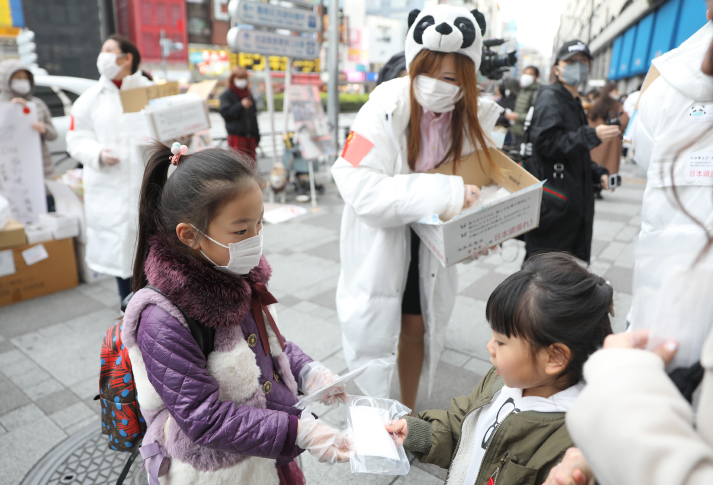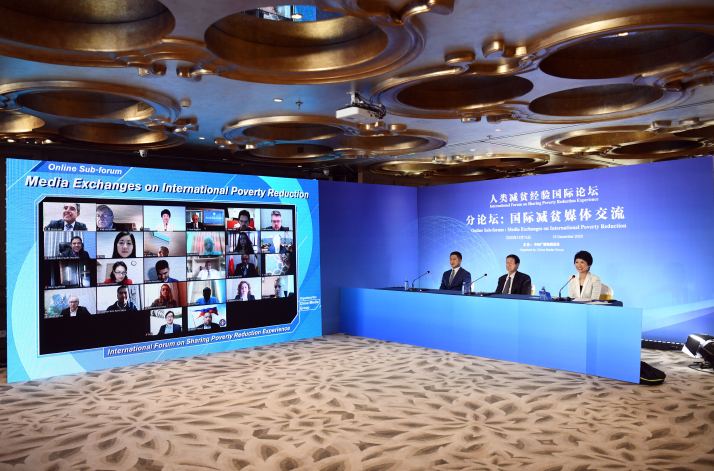| Voice |
| Why does 'sharing' really matter to the Chinese? | |
|
|
 A girl hands out masks to local children at Ikebukuro Station in Tokyo, Japan on February 29. Volunteer campaign Mask Panda Action was initiated by overseas Chinese after the epidemic outbreak in Japan to express their gratitude for Japanese people due to the latter's support earlier. (XINHUA)
"Sharing means to do business together or to exchange; it means to gain for both sides to Chinese people," Bartosch said. "This is deeply rooted in Chinese culture." The discussion was themed "2021: China in the World" and was hosted by China International Publishing Group and Beijing Foreign Studies University with scholars from the circles of international relations sharing their reviews and foresights at the end of 2020. Bartosch has gotten involved in and seen the efforts of poverty alleviation across China. "I went to Guizhou Province in southeast China 15 years ago," he said. " I've seen people getting rich in the countryside, peasants who lived in poor conditions now own three-story buildings." After eight years of continuous efforts, China has lifted nearly 100 million poor people in rural areas out of poverty, a feat also regarded as a significant contribution to the global poverty reduction cause.  The International Forum on Sharing Poverty Reduction Experience was held in Beijing on December 15 (XINHUA)
Khan added that her country recognizes that the first thing they need, which the Belt and Road Initiative is all about, is introducing hard infrastructure and energy infrastructure. The second phase of the initiative is about targeted poverty alleviation and focusing on social economic development. "One of my country's mottos a few years ago, before the Belt and Road Initiative, was 'we want trade, not aid'. We don't need small stipends to keep people alive. We want to give them a reason to live, to strive for a better future. This is where China's policy of reaching out of the world, the Belt and Road Initiative, is significant," Khan said. The main mission of the Belt and Road Initiative is to create a global community of a shared future for mankind. It upholds its noncompetitive and nonexclusive nature to the fullest extent, which reflects the international community's demand for a global governance system that is fair, egalitarian, open and inclusive, according to a report entitled "The Belt and Road Initiative: Progress, Contributions and Prospects." "Chinese people's sharing helps them on their road to a better life," said Bartosch, who has worked on comparing eastern and western philosophies for years. "The spirit of sharing is entrenched in the key elements of poverty alleviation, but in western mythology, "to share" equals "to lose." "For Chinese people, sharing doesn't mean that we share what we have, but we work together and on that basis we share." Bartosch said, adding that in Chinese philosophy, a peasant must work with the others on the field, to subsequently share the outcome. "This is ancient wisdom and a logical thing for a Chinese person living in a Chinese civilization of 5,000 years of agricultural civilization to adhere to." The above stands in stark contrast to western civilizations, according to Bartosch, "That's why so many wars have been fought: World War I, World War II… That's all about this wrong perception of the concept of sharing. " "What is the message the world perceives as China is becoming stronger?" said Wang Yizhou, professor of international politics at Peking University. "There is a gap in perception when it comes to China's image. Some countries keep a wary eye on China's development, whereas the Chinese people think their country's contributions to the world will definitely make it better." Wang suggests for China's people and media to engage more actively into world affairs and fill the existing information gap. Copyedited by Elsbeth van Paridon Comments to ffli@bjreview.com |
|
||||||||||||||||||||||||||||
|